Tag: tim wilson
Dr Jonathan Miller
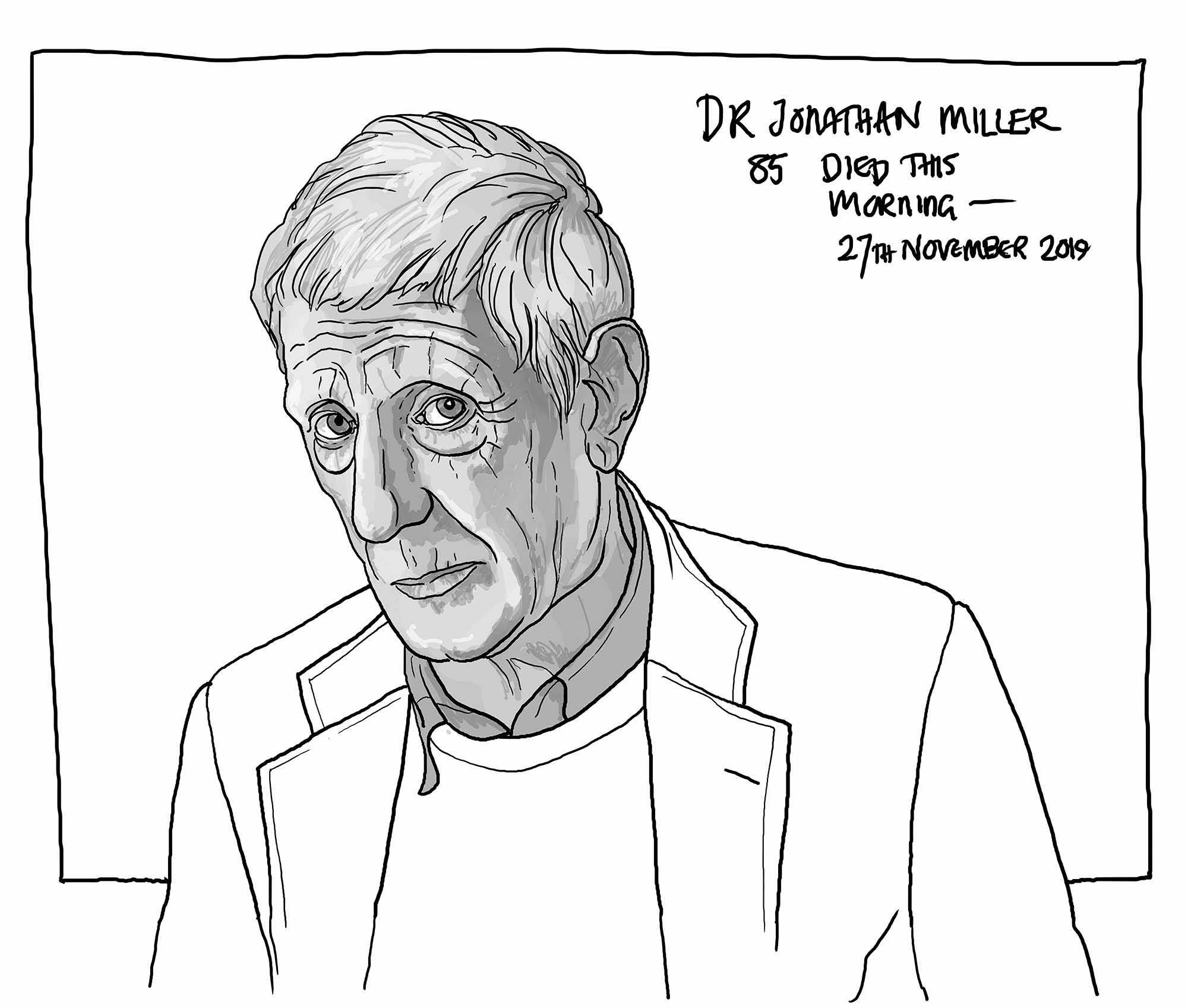
As it happened: Mrs May’s 3rd VOTE

American History’s biggest fibs

The first of three episodes begins on Thursday on BBC4 this week. I have completed animated linking sequences and inter-titles throughout the 3 programmes as I did in the previous series (“British History’s biggest fibs”) The imagery this time is drawn from American posters and typography- the title sequence itself should remind people of the currency which is a good start!
Lucy, as ever, is brilliant!

A view of Abingdon
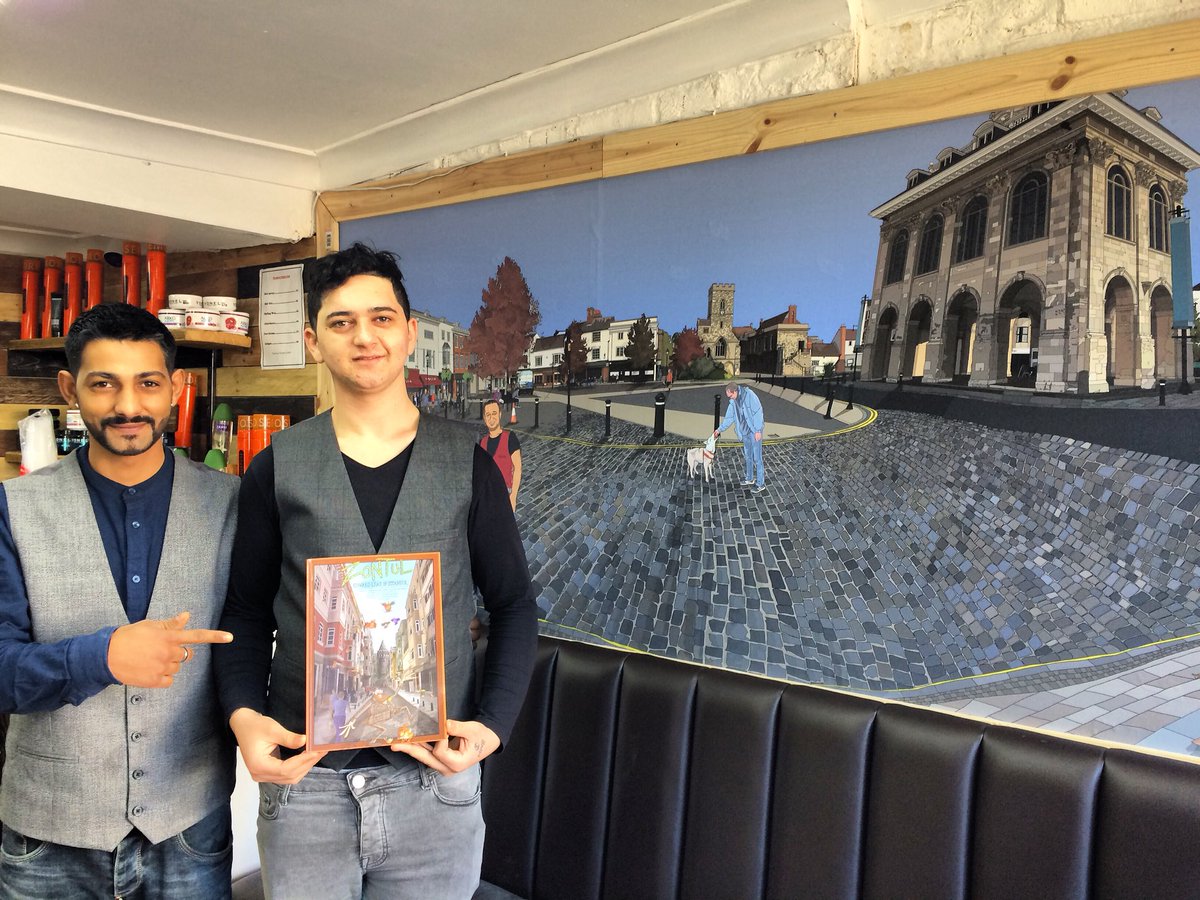
This was done last year.
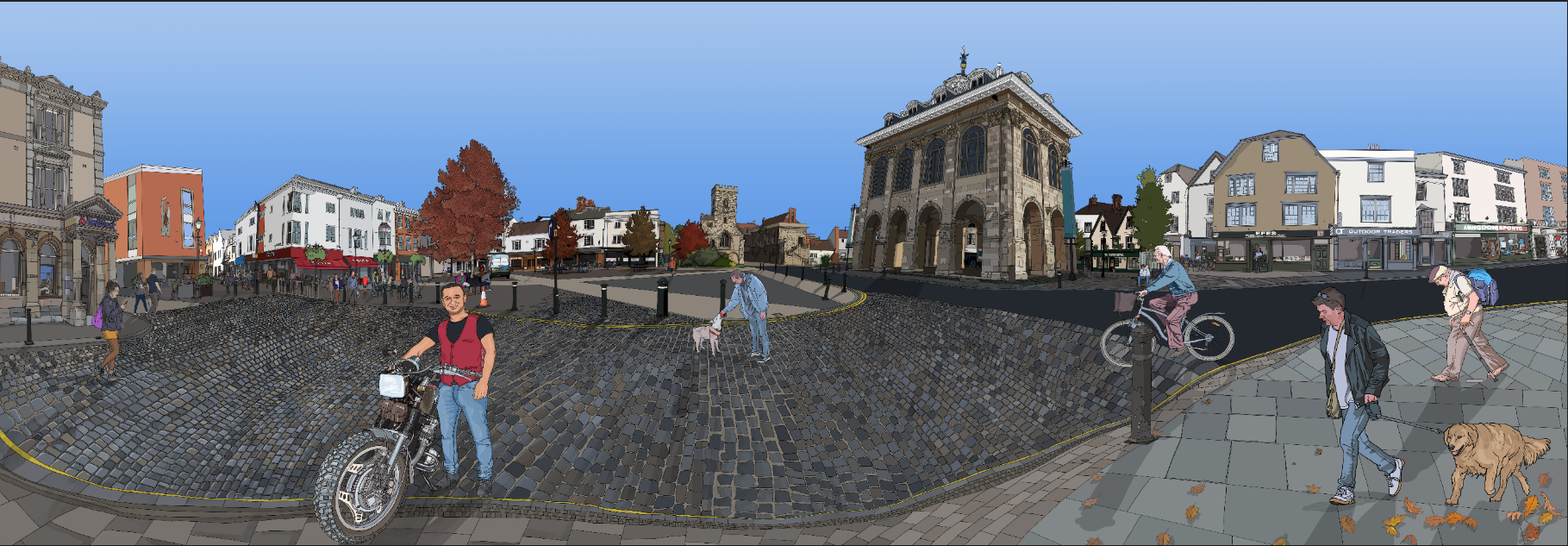
Matthew Hedges needs support

A very worrying case says the Foreign secretary as Matthew’s rights are “violated on a daily basis” by his UAE captors. Another Disappointing story that makes difficult reading. He is currently awaiting a first hearing, apparently scheduled in the next 10 days, after being detained in May at the airport.
Guy Fawkes and Hallowe’en
I intensely dislike the fact that people omit the apostrophe in “Hallowe’en”. It suggest they have no idea at all about the meaning of the word and the origins of the festival (Maybe, more on that later). Mostly, I find it a little sad that today Hallowe’en eclipses the thoroughly British festival of Bonfire night on 5th November.
By the Victorian period, 5th November was known as “Guy Fawkes night” and in the early part of the 20th Century, it was rebranded “Fireworks night” to promote the sale of rockets and catherine wheels.
This week, I am in Cambridge and chanced upon a huge Guy Fawkes celebration on Jesus Green with an enormous bonfire and about 10 minutes of spectacular, if moderately repetitive, red and blue fireworks. Having taken credit for staging the event, and listing their sponsors, the event’s dj promptly boomed across the speaker system to praise the annual “free” event, and ask everyone for a minimum donation of £3 which rather suggested the event was not free after all, or that someone planned to make a sizeable profit out of it.

TIM IN CAMBRIDGE
Today, there is the ubiquitous mask from V for Vendatta (2006), itself based on a book by Alan Moore, but that is really a rebooting of the old myth. And myth is the appropriate word because Guy Fawkes transcends historical events. Indeed, he was not the central figure in the conspiracy at all. He was simply the most exotic and the one caught in the cellar with the gunpowder.
Guido, Guy Fawkes was born in Yorkshire in 1570, befriending some of his fellow conspirators at school, but by 1593 he had left England for Flanders and from there joined the Spanish Army to fight protestants in the Eighty Years’ War.
When the Queen was dying, he was part of a mission to The Spanish court to gather support for a second Spanish invasion and when Elizabeth was succeeded by James I, another Protestant, the die was cast and in 1604, Guy Fawkes met up with this fellow Gunpowder plotters to hatch a plan.
The Plotters were Thomas Percy, John Wright, Thomas Wintour, Thomas Bates, Christopher Wright, John Grant, Robert Wintour, Humphrey and Stephen Littleton, Robert Keyes, Ambrose Rockwood, Sir Everard Digby, Francis Tresham, and Thomas Habington.
They were led by Robert Catesby and met in Ashby St Ledgers, just up the road from where I live. He devised the plan to blow up the Houses of Paliament during the reading of the “Gracious Speech” on 5th November 1605. This also involved kidnapping James’ daughter Elizabeth and marrying her off to a senior Catholic nobleman.
Percy rented a cellar under the Parliament which meant there was no need for the elaborate plan of tunnelling under the building. It was stacked with 36 barrels of gunpowder along with wood and sticks. Fawkes took on the role of looking after this cellar and its contents, under the assumed name of John Johnson.
The conspiracy was betrayed because on 26th October, Tresham, a person who was not part of the original conspiracy, wrote to his brother-in-law William Parker, Lord Monteagle, to warn him not to attend the State Opening. Monteagle passed the letter on to the spy chief, Robert Cecil and while this chain of events leaked back to the Conspirators, they, neverthless, decided to carry on with their plan.
The Lord Chamberlain along with Monteagle searched Parliament on 4th November and located the cellar. They reported back to the king who personally ordered Sir Thomas Knyvet to enter the cellar and seize Fawkes red-handed, which, indeed, he did early in the morning of 5th November. The conspiracy was exposed, Fawkes tortured for details and along with Thomas Wintour, Rockwood and Keyes, he was hanged, drawn and quartered. The day before, Digby, Robert Wintour, Grant and Bates were similarly executed.
There are stories emerging that suggest that the whole thing was an inside job and that Fawkes was really working under Cecil in a fledging MI6. This seems unlikely, but what is certain is that the king knew of the plot the day before and that Guy Fawkes’ arrest was delayed, for maximum political capital. The story certainly played well for the crown, rallying support for an unpopular successor to Elizabeth and acting as effective propaganda against a revival of Catholicism.
On the evening of 5th November 1605, people around England and Scotland apparently made bonfires to celebrate the king’s deliverance. Later, effigies, often of the Popes were added to what became an annual festival. Back in the late 70s, I recall Political figures being burnt on the sands of St Andrews. Rather more dramatic festivals continue in Lewis. This year, Theresa May was burnt on the bonfire after being paraded through the streets.
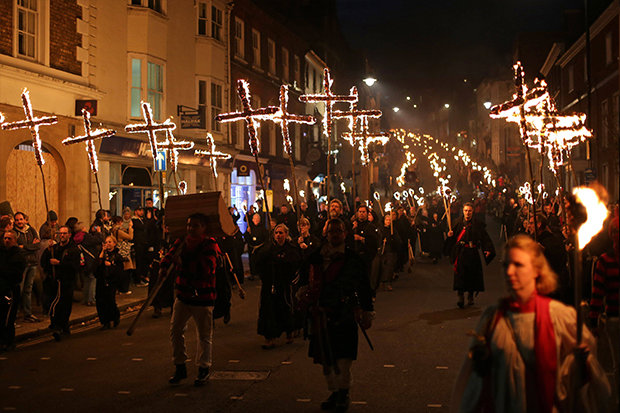

MRS MAY IN LEWES
Perhaps the most entertaining fact about the original Gunpowder plot, however, lies in general stupidity. Because the conspirators left their gunpowder in the barrels for so long, the gunpowder “decayed”; it separated back into its constituent elements and was, by 5th November, pretty well useless. Had Fawkes lit the stuff, nothing would have happened. The gunpowder might have still been more effective one month earlier when Parliament had originally been scheduled to meet, but an outbreak of plague in London had caused a delay.
Aaron Banks and Andrew Marr
The details about Mr Banks’ apparent deception of Parliament along with the opening of a police investigation mark a new stage in the misery of Brexit, but not really one we could not have anticipated. It is surely right to ask whether, if the Leave campaign was funded with dodgy money, it is time to call for another properly organised referendum. This would not be a second referendum or even a referendum about the preferred exit details, but rather an entirely new process as the previous efforts are rendered null and void by potentially criminal activity.
We could run the same question again, and see what happens this time. There is now good reason to rerun, and more than that, we now have enough evidence to know what both “Leave” and “remain” might mean in practical terms. Somehow, I suspect the result would no longer be in favour of Leaving. But if “Leave” is so confident it is right,(Farage says “Leave would win by a much bigger margin”) it should be prepared to be tested again, when the competition can be properly monitoring and judged to be fair.

Indeed, before Banks, the Electoral Commission had already castigated the Leave campaign. It found that ‘Vote Leave’ officials were guilty of overspending £449,079.34. A criminal offence. More than that, the Facebook fiasco during the Referendum debate still threatens a £500,000 fine from the Information Commissioner. To cap it all, the House of Commons Digital, Culture, Media and Sport Committee on ‘Fake News’ concluded Russia has engaged in ‘unconventional warfare’. So there are three strikes and all pointing to wrongdoing to secure a Leave vote.
When MPs and Councillors are found guilty of electoral fraud, they are suspended and in the case of Bob Spink, for instance, given a prison sentence (admittedly suspended). In the case of the Leave campaign, no real action is taken.
This is what happens as a rule: four people were jailed and a fifth person was given a suspended prison sentence for electoral fraud after a local by-election in Maybury and Sheerwater in Surrey in 2012: Shaukat Ali, Parveen Akhtar, Shamraiz Ali, Sobia Ali-Akhtar and Abid Hussain, from New Haw, were charged over claims that postal votes were being fraudulently submitted. They were all convicted of conspiracy to defraud at Reading Crown Court. Shaukat Ali was jailed for 15 months, Parveen Akhtar and Sobia Ali-Akhtar were both jailed for nine months, and Shamraiz Ali was jailed for six months. Abid Hussain was given a six-month prison term suspended for 18 months.
In other words, in normal cases of Electoral fraud, there are consequences for the people who tried to benefit from criminal activity. The electoral result that was skewed by their malpractice is voided, the people involved punished and the election run again.
Not so with Brexit. Not so for those involved in damaging the integrity of the Leave Campaign.
One might argue, of course, that there were only a few “bad boys of Brexit”…
But so far, nothing is emerging about naughty Remainers. Their campaign, which was almost successful was not dogged by suspicions of outside interference, the abuse of facebook, or proven overspending. Now, finally, at the 11th hour, the Banks’ stuff emerges.
Now is the time to act.
Today the Observer ran an article exposing what seem to be dodgy dealings in the Banks’ empire. Allegedly, Eldon Insurance employees were made to work on the Leave campaign, some against their will. Together with the racism that invaded the campaign, some of it apparently printed by Rock services, and much of it informed by the darker forces allied with UKIP, the questions surrounding Mr Banks at least demand a proper debate before it is too late and we are fully committed to Europe in the half-way house peddled by Mrs May’s Chequers’ agreement.
As for Banks’ performance on Andrew Marr, well- the question was asked: “Where did the 8m come from?” and the answers that emerged were a mixture of obfuscation, aggression and arrogance that had Marr floored (“this is what you do, you smear other people” was what Marr was left to observe).

But Banks says he would have voted remain if he had known what a Leave vote might mean. This from the man who is alleged to have bullied his staff into working for the Leave campaign. If there was another vote today, in other words, the leading Leave campaigner would be voting to remain. That beggars belief!
Banks is a great puzzle. A former vacuum machine salesman, he amassed a fortune quite suddenly and then bankrolled UKIP. His CV needs a good deal of explaining- he may or may not have worked for Norwich Union or Warren Buffett and he may have made £100 million out of his sale of Brightside, though records suggest the figure was closer to £22. His mother-in -law, Olga Paderina, says today that he has done nothing wrong. Nevertheless, a cloud hangs over him.
If Banks is dodgy, and it remains to be seen- any trial will be too late to repair the damage he has done.
The risks of Brexit alone, with or without Banks, as they have emerged, might make it expedient to hold another public vote.
In any other situation we would have called time. Instead, we persist with a charade that we are doing “democracy”. We are not even doing that.
There are a number of ways to analyse the events of 23rd June 2016. the Brexiteers might cite the 263 that voted to leave in contrast to the 119 that voted decisively to remain. That would be a 68.85% majority vote. But this is never the figure put forward. Instead, people concentrate on the overall percentage of voters throughout the kingdom who voted to leave. That is just 17,410,742 votes.
In other words, with 51.89% voting leave out of a 72.21% turnout, that is not even a 50% majority. This is hardly decisive.
My friends in the Leave group, particularly from UKIP, tell me that should the Leave vote be ignored, there will be riots in the streets. I suppose that is a threat and we should not give in to that sort of thing. Maybe they will turn on Aaron Banks now he has said he would vote to Remain.
But much more than all that, the possibility that there was major wrong-doing behind the campaign makes the strongest case for pulling the plug now. We cannot do so after March. Stronger than expedience, stronger even than resisting bullies who threaten disorder is we do not do what they want. No. If we do nothing about electoral mal-practice, we condone it. That means the integrity of our political system is under threat.
Teaching English
below are some tips and vocabulary for writing and especially for getting through the IELTS exam
Everyone talks about grammar. At least they do in Russia!
I think this is maybe to miss the real problem in learning English.
One of the most difficult things for english learners is to master vocabulary. Most text-books focus on grammar, because that is something that can be tested and taught in a very formalistic way, but, actually, there is very little grammar in modern English.
The hard work comes from learning and using synonyms correctly. In terms of listening, that mastery of vocab is expressed in a knowledge of collocations- how words stick together. This means that we can anticipate the sort of things we hear because we are used to the way one word naturally attaches to another. Instead of listening to every single word, we listen to the sense of what is being said and anticipate which words will be used.
In terms of the two essays, the graph essay (1) needs to be clear and precise. The second essay needs similar clarity but evidence of development. Idiomatic vocabulary throughout as well as “linking words”
Here are some valuable
linking words
now
at the moment
at present
right now
these days
nowadays
in the past
before
then
at that time
years ago
when I was younger
soon
ideas:
I think one important thing is
I guess one difference is
I suppose the main difference between A & B is
Causes and Solutions
I imagine it’s because
it appears to be
I guess it’s because
the main reason is
it is caused by
because
I suppose the best way to deal with this problem is
I reckon the only answer is
the best way to solve this is
**there are three important points: firstly (A), secondly (B and thirdly, finally, (C) (this is my preferred option always- the tricolon) This can often come across as very formal so be careful!
Giving examples
For example
for instance
such as
like (use in speaking, not so much in writing. Do not over-use this word)
Being clear and precise
What I mean is
What I want to say is
As I was saying
contrasts and concessions
but
on the one hand (remember two hands) on the other hand
while
although
or
admittedly,
however,
nevertheless,
even though
although
yet
despite
in spite of
still
by contrast
conversely
in comparison
alternatively
another option could be/ might be
Linking words for writing
in addition
additionally,
furthermore,
moreover,
apparently,
also
not only… but also
as well as
consequence
hence
in that case
under these circumstances
accordingly
Because of this,
thus, therefore, so
Deduction:
in that case
this implies that
if so, / not
giving examples:
to illustrate
to clarify
in other words,
such as
namely
for instance
reinforcing:
also,
furthermore,
moreover,
in addition
besides
in the same way that
not only… but also
highlighting:
particularly
in particular
specifically
especially
obviously (be careful- if something is obvious, there is no point in saying it, and if it is not obvious, then you have the wrong word!)
of course
particularly
mainly
generalisations:
usually,
generally
on the whole,
as a rule
conclusions:
in brief
to summarise,
overall,
therefore,
(succinctly)
Here is a rough speaking test:
Speaking test
Interview
– What is your full name?
– Can I see your ID?
– Where are you from?
– Do you work or study?
– Where are you studying or working?
– Do you like your school or your company?
– Do you want to change your school/company?
– Do you usually drink water?
– Do you prefer to drink bottled or tap water?
– Is bottled water expensive in your country?
– Why is that?
– Do you like shoes?
– How often do you buy new shoes?
– Have you ever bought shoes online? Why / why not?
Cue Card
Describe a part of your country that you find interesting. Please say
– What and where is it?
– How do you know about it?
– What activities do people usually do there?
Discussion
– Why do you think this place is interesting?
– Why do people love to visit some parts of the country?
– Why do people want to settle in certain places?
– What are the main differences between places to visit and to live in?
– Why are people different in different parts of the same country?
Next time: vocabulary for Pie charts and graphs (Essay 1)
Hanim the cat again
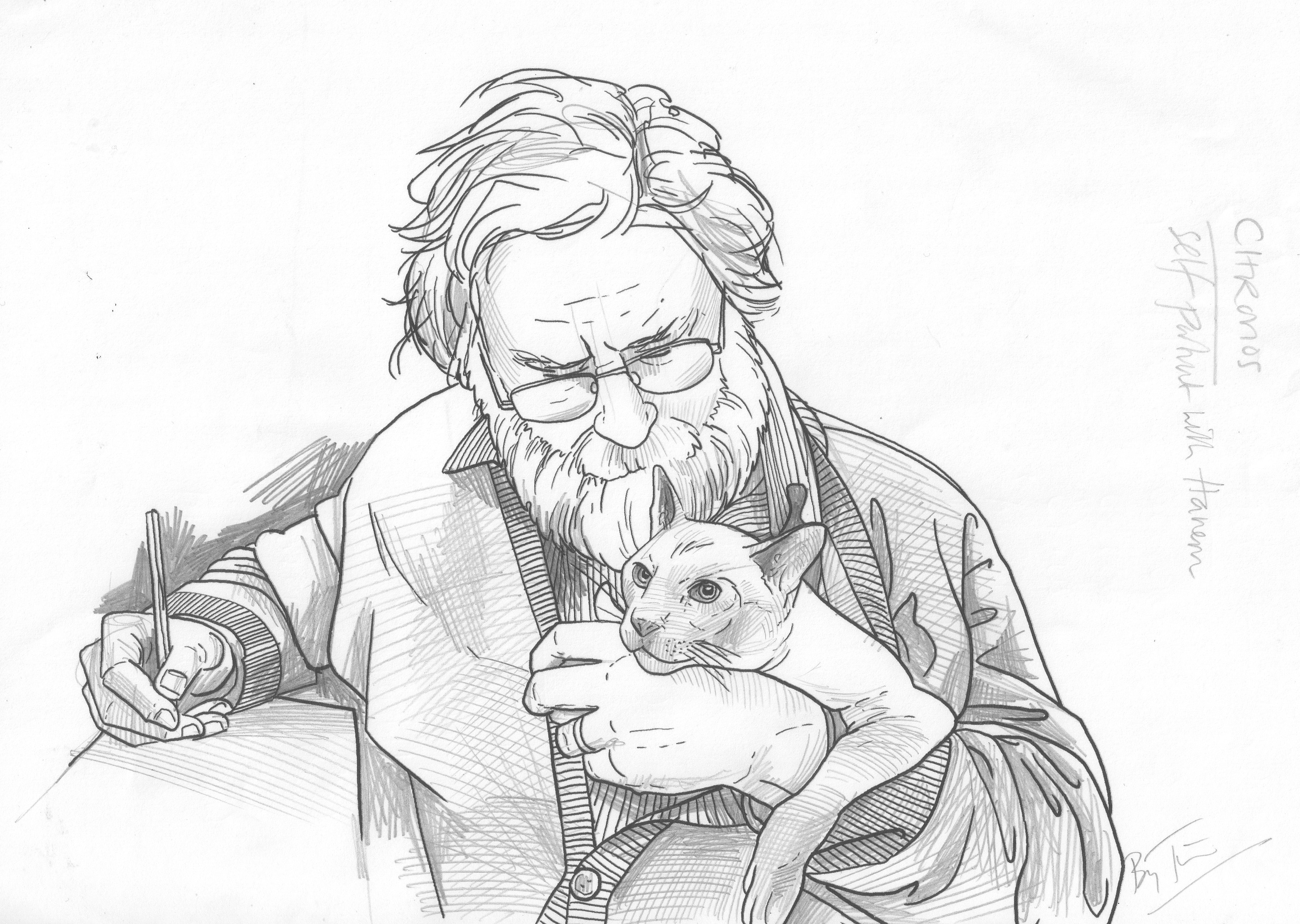
When she was small, Hanim had a fairly major illness and took refuge in my dressing gown pocket. Now she is much older and a bit unstable, she has taken to snuggling into my cardigan. It is not always convenient. This evening, I was drawing some stuff for the FOLLOWING LEAR project, and, instead, ended up drawing Hanim. She has such intelligent eyes.
